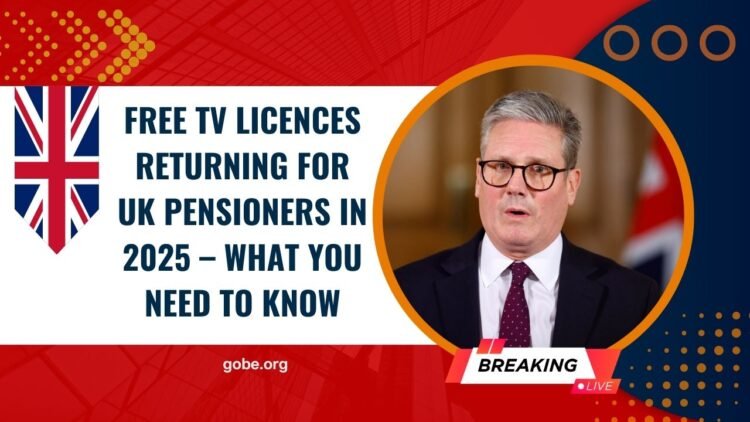In a major policy reversal, the UK Government has confirmed that free TV licences will be restored for all pensioners aged 75 and over starting April 2025. This means that millions of older adults who lost this benefit in 2020 will no longer have to pay the annual licence fee.
With the rising cost of living, this change is being celebrated as a big relief for elderly households across the UK. Below are all the key details: who is eligible, what the benefit covers, what has changed, and how this affects pensioners financially.
What Has Changed: Timeline & Key Details
| Feature | Before 2025 Policy | From April 2025 Onwards |
|---|---|---|
| Eligibility age | Over 75, but only if receiving Pension Credit | All pensioners aged 75+ automatically eligible, no means-testing |
| Who pays | BBC paid for those on Pension Credit; others had to buy licence | Government funds restoration; BBC no longer burdened with universal funding |
| Cost of licence (approx.) | ~ £169.50/year for those who had to pay | Pensioners aged 75+ save full amount annually |
| Number of beneficiaries | Restricted to those on Pension Credit; many over-75s excluded | Over 4 million pensioners eligible under new universal scheme |
| Automatic registration | Must prove Pension Credit or apply separately | Licence renewals become free automatically for existing eligible; turning-75 persons must update records |
Who Will Now Benefit
The restored scheme is universal for pensioners aged 75+, meaning:
- If you are already 75 or older, your licence becomes free at your next renewal.
- Those who reach age 75 in 2025 will need to inform the licensing body to ensure free licence status begins.
- Residency in any part of the UK qualifies — England, Scotland, Wales, Northern Ireland.
- Pensioners living in care homes are also included.
Very importantly, no income test or benefit status (like receiving Pension Credit) will be required. The free licence privilege is restored for all over-75s, regardless of means.
Financial Impact: What Pensioners Will Save
The annual licence fee currently stands at about £169.50. Under the new plan:
- A single pensioner household aged 75+ will save that full amount per year.
- Couples who are both over 75 or where both licences are needed benefit similarly.
- With over 4 million pensioners eligible, the total cost to the government is estimated in the hundreds of millions annually, but supporters argue the social benefit — reducing isolation, improving access to information — outweighs the cost.
What Pensioners Need to Do
- Check your age: If you are already 75, check your renewal date. If you’re turning 75 in 2025, notify the licence authority.
- Renewal: Your licence renewal will reflect the free status automatically for existing eligible licence holders.
- Update records: Ensure your address and age are correctly recorded. You may need to confirm identity/age if requested.
- No income proof required: You won’t need to apply for or prove receipt of Pension Credit; eligibility is age-based.
The restoration of free TV licences for UK pensioners aged 75+ in 2025 marks a significant step in easing costs for the elderly. No longer confined only to those claiming Pension Credit, all over-75s will save the annual licence fee.
With automatic renewals for existing licence holders and simple steps for those reaching the age in 2025, this policy offers relief during difficult economic times.
If you are 75 or will be this year, make sure your records are up to date — this change can save you around £169.50 per year, and more importantly, help maintain access to news, entertainment, and connection without financial stress.
FAQs
Do I still need to apply or prove income?
No. From April 2025, all pensioners aged 75 and over will receive a free TV licence automatically. There is no means testing.
When exactly does this come into effect?
The policy takes effect in April 2025, at the start of the new financial year.
What if I turn 75 in 2025?
You will need to inform the TV Licensing authority of your age once you turn 75 so your licence transitions to free when you renew.

